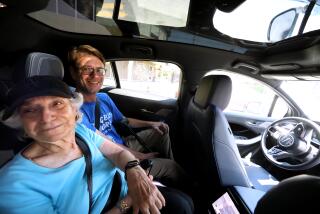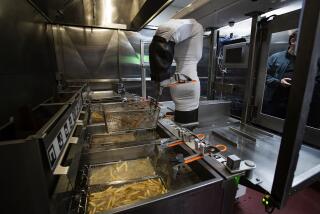Human sign wavers give way to flash text dummies
- Share via
They are the hardest-working stiffs in Los Angeles. At least until they go on “sick leave.”
Ginger and Sarah are among dozens of robotic mannequins who work 10 hours a day, seven days a week, standing outside hair salons, restaurants and quick-lube businesses, waving at passersby and encouraging them to stop and spend a little money.
The motorized dummies are the newest breed of sign spinners -- the ubiquitous attention-grabbers who dance on street corners and toss their arrow-like signs in the air to promote nearby apartments and condos, cellphone companies, furniture sales and fast-food restaurant deals.
Marketing expert David Fines was renting out the human sign twirlers 71/2 years ago when one of his customers threatened to sue him because of an altercation he’d had with one young spinner. Fines’ wife mused that he probably should have robotic arrow spinners instead of live ones.
That prompted Fines, a Sherman Oaks resident, to create a sign-waving mannequin. Today, his Sun Valley-based Sign Waving Robot Co. molds them out of plastic and fits them with wigs and clothing. They come with a motor powered by a rechargeable battery that provides about 15 hours of waving.
The company sells its premium model for about $2,000 and rents mechanical wavers for $30 a day. So far, 472 of them are in use worldwide, he said.
It was also a young sign twirler working on a Ventura Boulevard corner who was the inspiration 21/2 years ago for one of Fines’ competitors.
It was a scorching day, and Soloman Levy, also a Sherman Oaks resident, marveled at the energy the sweating man was putting into his work. “Poor guy,” Levy thought. “He should have a machine doing what he’s doing.”
That prompted Levy to connect a motor to a mannequin so that it wiggled the advertising sign in front of its arms.
“My dad put a couple of them together and immediately sold them,” said his son, Adir Levy, who has headed North Hollywood-based Sign Dolls since his father’s retirement last fall.
Levy imports his battery-operated mannequins from China. They rent for $370 a month or can be purchased for $797. The plug-in electric models go for about $50 less.
Although male mannequins are available, “the females outsell them 99 to 1,” Levy said. “We have a busty model and one with a regular figure. The regular one is more popular: I personally think the busty one is overdone.”
Passing motorists find the 65-pound sign wavers convincingly realistic.
“I was at a convention in Las Vegas last weekend, and several guys came up and tried to talk to the sign dolls,” Levy said. Bar customers, he said, sometimes pose with the mechanical female sign waver parked in front of a nearby shop.
The makers of robotic mannequins tout their creations as ideal workers who are always on time, never need a lunch break and never complain about being underpaid.
They sometimes call in sick, however.
A robotic sign waver that drummed up business for the Planet Cyber gaming center in Canoga Park and its companion shaved-ice refreshment stand has been sidelined by a motor malfunction, said Omar Ortiz, a computer technician at the center.
“We’ve named her Sarah,” said owner Joe Sazi. “She’s in shorts, a red shirt, a hat and sunglasses. She looks like she’s at the beach.”
And a mannequin in a short chef’s skirt and hat is off work at The Baker cafe in Woodland Hills because of a broken arm.
“A couple of cooks were wheeling her out one morning and she fell apart,” said Shamiran Alkhas, an assistant manager.
“Although I think it was silly, she did draw in a few customers.”
Server Kevin Sy agreed that the sign waver “caught a lot of people’s attention. They’d say that it was cute -- I think people actually came in here because of it.” Sy blamed “the sun beating down on it” for the robotic waver’s demise.
Angelica Fleming, owner of the Hair Station Plus salon in North Hollywood, acquired her mannequin three months ago. It is dressed in a Superwoman suit and goes by the name Ginger.
“It works very well. I get extra customers because of her,” Fleming said. “People can be crazy, though. I had to stop one person who was trying to take a picture under her skirt.”
Professional human sign spinners, meantime, say they don’t view the robots as a threat.
“We really don’t worry about the mannequins,” said Christian Altamirano, general manager of AArrow Sign Spinners’ Los Angeles office. The company, established in 2002, employs about 100 red-shirted spinners locally and thousands elsewhere.
“We have energy and athleticism,” Altamirano said. “Our team members smile and dance and react to the public. They definitely have a stronger presence than a robot.”
For passersby who enjoy watching the twirlers, that’s a good sign.
--
More to Read
Inside the business of entertainment
The Wide Shot brings you news, analysis and insights on everything from streaming wars to production — and what it all means for the future.
You may occasionally receive promotional content from the Los Angeles Times.











